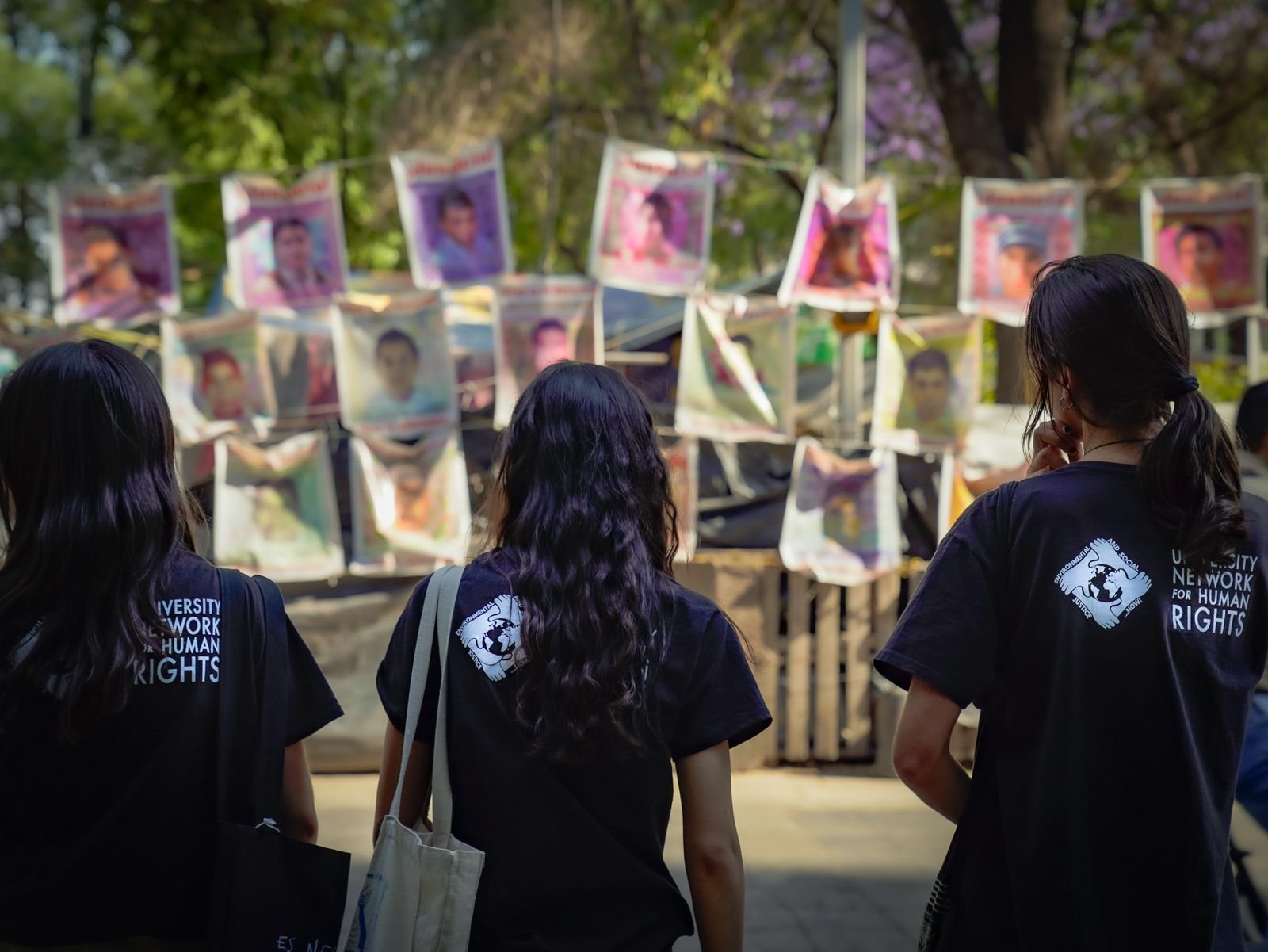Pursuing Access to Justice for Disappearances in Mexico
UNHR through Arts Coordinator Mica Borovinsky and Yale students Leyly Moridi and Lucía Amaya Martínez at the Roundabout of the Disappeared (Glorieta de las personas desaparecidas), in Mexico City, Mexico (March 2024)
Last updated October 2025
Disappearances in Mexico undoubtedly represent the most serious human rights crisis in the country, and one of the most critical in the region. There are over 133,215 disappeared people in Mexico as of July 2025, according to Mexico's National Registry of Disappeared Persons. However, the Committee on Enforced Disappearances (“Committee” or “CED”) and the Working Group on Enforced or Involuntary Disappearances has noted that, “in many cases, disappearances go unreported, and thus the scale of this tragedy may even go beyond what is currently registered.”
The broader context is one of near total impunity: Officials at every level of government are either directly responsible, complicit, or unable or unwilling to investigate reported disappearances. According to official information, as of November 2021, between 2 and 6 percent of cases of disappearance had been brought before the courts, and only 36 judgments had been issued in such cases at the national level. The vast majority of the disappeared are never found. Families of victims rarely discover the truth about what happened to their missing loved ones.
UNHR Associate Director Sofía Galván, Human Rights through Arts Coordinator Mica Borovinsky, and Yale students Lucía Amaya and Leyly Moridi with Karla Quintana, former head of the National Search Commission (Mexico City, March 2024)
In April 2025, the CED activated for the first time in its history the procedure under Article 34 of the International Convention for the Protection of All Persons from Enforced Disappearance in relation to Mexico. This means that the Committee considers that disappearances in the country are widespread or systematic. This special procedure, used only as a last resort, allows the CED to present the case to the UN General Assembly if it determines that Mexico is not taking sufficient measures to address the situation. The Committee is currently assessing the information received as part of this process.
Help us combat impunity for disappearances in Mexico
Seeking Justice
UNHR Associate Director Sofía Galván, Human Rights through Arts Coordinator Mica Borovinksy, and students Lucía Amaya and Leyly Moridi with Luis Daniel Vázquez, researcher at the Institute for Legal Research at the National Autonomous University of Mexico. (Mexico City, March 2024)
In this context, UNHR has been supporting families and communities who are direct or indirect victims of disappearance,, in exercising the right to justice. Under UNHR supervision, students from Wesleyan and Yale have traveled to Mexico since 2024 to interview experts, leaders of colectivos, and family members of the disappeared with the aim of understanding the challenges of access to justice and identifying initiatives aimed at ensuring this right.
Building on our documentation work, we co-published with Fundar the report “Disappearances in Mexico: Active Impunity and Obstacles to Justice and Search.” The report provides a current analysis of the situation in Mexico, highlighting the key challenges to accessing justice, particularly in the areas of investigation and search efforts. This report was also submitted to the Inter-American Commission on Human Rights, which will be publishing a report on the matter.
UNHR interview with Alma Rosa Preciado in Mexico City, Mexico (March 2024)
As a result of our visits, we have built and strengthened relationships with community partners, including the Collective in Search of Truth and Justice (Colectivo en Búsqueda de Verdad y Justicia). Our goal is to give them a direct voice and empower them in the fight for their rights, particularly in using international mechanisms to defend those rights. We have also produced a series of short videos and artworks highlighting the stories of missing people and their relatives searching for them.
Drawing the Disappeared, by Mica Borovinsky
(Image descriptions from left to right)
1. UNHR Senior Advisor Sofía Galván and Yale students Lucía Amaya and Leyly Moridi with Piero Vásquez, international human rights expert (Mexico City, March 2024).
2. UNHR staff Sofia Galván and Mica Borovinsky, alongside Yale student Lucía Amaya, meet with Humberto Guerrero of FUNDAR, a leading human rights organization in Mexico. (Mexico City, March 2024)
3. UNHR Senior Advisor Sofía Galván, Human Rights through Arts Coordinator Mica Borovinsky, and Yale students Lucía Amaya and Leyly Moridi with Karla Quintana, former head of the National Search Commission (Mexico City, March 2024)









